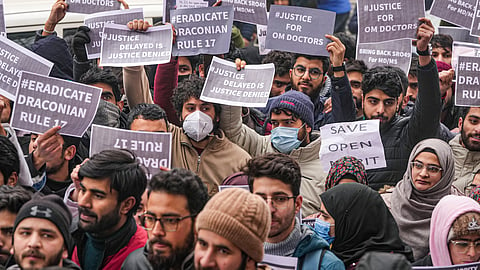

Days after protesting students in Jammu and Kashmir met Chief Minister Omar Abdullah and discussed the “rationalisation” of the reservation policy of the union territory, the association says that it is yet to receive any clarity from the government.
Nasir Khuehami, National Convener of the Jammu & Kashmir Students' Association, told EdexLive today, December 26 that the JKSA is open and willing to engage in discussions and deliberations with the state government — and is forming a special delegation for that purpose.
“The delegation would be comprised of not more than 15 medical students and aspirants from communities in the unreserved category and 1-2 office bearers of the JKSA,” he informed.
On Monday, December 23, five of the students protesting against the Union Territory's reservation policy met with CM Abdullah. They demanded that the government revise the reservation policy for admission and employment in the state and halt ongoing recruitment drives for various public posts. The CM asked to meet few of the protesting students, heard their demands, and allegedly assured that a review report would be submitted after six months.
This meeting followed a protest called by Aga Syed, Member of Parliament (MP) from the Srinagar constituency outside Abdullah's residence, which was attended by students from all over the state in droves. The JKSA extended their support to the protest, with its office bearers also joining in.
Under the current reservation policy, up to 70 per cent of the seats and posts in government education institutions and bodies are reserved for Scheduled Tribes (ST), Socially Backward Castes (SBC), people living near the Line of Actual Control (LAC), Physically Challenged (PHC), children of defence and police personnel, sports achievers, and ethnic communities such as the Paharis, Paddari tribe, Kolis, and Gadda Brahmins.
This leaves 35 per cent of the posts and seats for the open category. Students and job-seekers from unreserved communities have been protesting against the policy for weeks now, claiming that it severely limits opportunities in education and employment.
In a statement released yesterday, December 25, the JKSA criticised the state government for its “absence of communication” on the issue following the meeting with the CM and alleged that no official statement of minutes of the meeting was shared.
They even demanded that the subcommittee formed to review the reservation policy be streamlined and include all stakeholders in the matter for greater fairness.
Reiterating their commitment to cooperating with the government, Kuhehami says, “We don’t seek the downfall of the government, as we finally have a government that was formed by popular mandate after five years.”
He adds that the association aims to bring back student issues to the mainstream, as they had been sidelined during the rule of the Lieutenant Governor (LG) from 2019 to 2024.
“We urge the government to take this issue more seriously, and be more transparent with its decision making. We are willing to support them and work with them, but we deserve more clarity,” he says.
